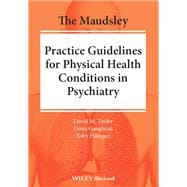Learn to improve your assessment, investigation, and management of physical health conditions in people with severe mental illness
The Maudsley Practice Guidelines for Physical Health Conditions in Psychiatry offers psychiatric and general practitioners an evidence-based and practical guide for the appropriate assessment, investigation, and management of common physical health conditions seen in people with severe mental illness. Written by a renowned team of respected experts in medicine, surgery, pharmacy, dietetics, physiotherapy, and psychiatry, the book bridges the gap between psychiatric and physical health services for the severely mentally ill.
The Maudsley Practice Guidelines for Physical Health Conditions in Psychiatry also provides practitioners with expert guidance on making effective referrals to other medical and surgical subspecialties, telling readers what information subspecialties would expect to receive. Its use will improve the quality of clinical care received by mentally ill patients and, by promoting a holistic approach to treatment that considers both body and mind, will enhance the therapeutic relationship between patient and practitioner.
The Maudsley Practice Guidelines for Physical Health Conditions in Psychiatry covers the following:
- Guidance on assessment and management of well over a hundred different medical and surgical presentations commonly seen in people with serious mental illness
- Management of physical health emergencies in a psychiatric setting
- Evidence-based approaches to management of physical side effects of psychiatric medications
- Advice on approaches to promote a healthy lifestyle in people with serious mental illness, such as smoking cessation and changes to diet and physical activity
Perfect for both psychiatrists and general practitioners who wish to improve the quality of care they provide to people with serious mental illness, The Maudsley Practice Guidelines for Physical Health Conditions in Psychiatry will be of use to anyone setting out to navigate the divide between the treatment of psychiatric and physical health conditions.








